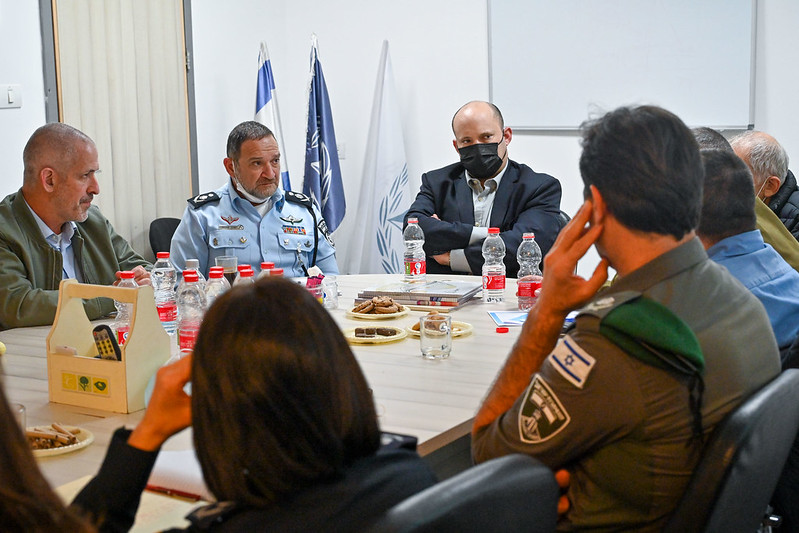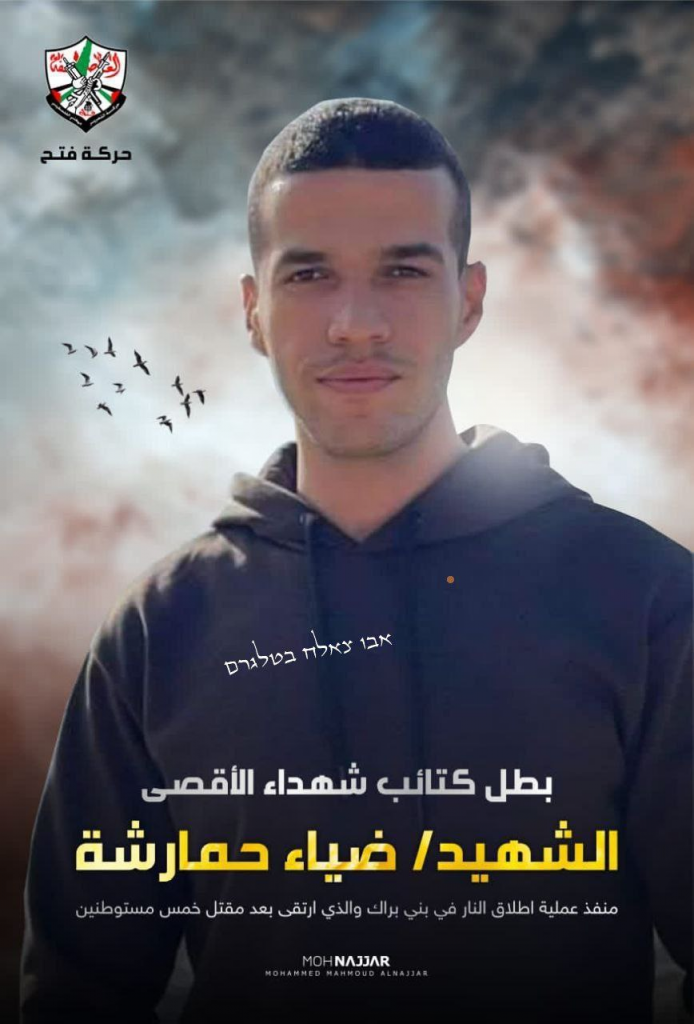FRESH AIR
Israel faces new terror wave and considers how to respond
March 31, 2022 | Ahron Shapiro, Oved Lobel

Within the span of one week, the Islamic State (IS) claimed two attacks inside Israel, the deadliest inside the Green Line since June 2016, when Palestinian terrorists inspired by IS conducted a so-called “lone wolf” mass shooting in Tel Aviv.
Then, on the evening of March 29, a Palestinian from the West Bank, opened fire with an automatic weapon in the streets of Tel Aviv suburb of Bnei Brak. He killed five people, including Amir Khoury, a Christian Arab police officer, and two workers from Ukraine.
The latter attack has not been linked to IS, as the early ones were – the gunman was affiliated with the secular nationalist Fatah movement associated with Mahmoud Abbas, the head of the Palestinian Authority. The three attacks together have nonetheless sparked widespread fears in Israel that the country is in the grip of a major new terror wave, and much debate about how to best respond.
In a recorded statement on March 30, Prime Minister Naftali Bennett announced a list of measures to rapidly bolster police presence throughout the country and urged Israelis that hold gun licenses to carry their weapons with them both as a deterrence and to allow them to act as first responders in the event of another terror attack.
IS has some history of terrorism in Israel
IS terrorism in Israel is not a completely new phenomenon.
A mass shooting terrorist attack by Israeli Arab Nashat Melhem in January 2016 in Tel Aviv was also inspired by IS. In 2017, Fadi al-Qunbar rammed his vehicle into a group of Israeli soldiers in Jerusalem, killing four and injuring over a dozen others, an attack attributed by then-Prime Minister Binyamin Netanyahu to IS. IS claims of responsibility for another deadly attack in Jerusalem in 2017 were disputed by Israel and Palestinian terrorist groups.
The more recent attacks, however, have revealed an apparent serious intelligence failure on the part of Israel’s Shin Bet security service. Abu al-Qia’an, the Israeli Arab who killed four Israeli civilians in a ramming and stabbing attack in Beersheba on March 22 before being killed by armed civilians, had previously been imprisoned in Israel until 2019 for attempting to join IS in Syria. Why he wasn’t monitored better following his release remains an open question.
Less than a week later, two IS-affiliated Israeli Arab gunmen conducted an attack in Hadera, killing two Israeli police and injuring several others before being neutralised. Importantly, one of these attackers had allegedly been arrested by Turkey in 2016 for trying to join IS, leaving another big question mark over how the Shin Bet failed to monitor him adequately. These March attacks are reportedly the first attacks inside Israel officially claimed by IS since the contested 2017 claim.
It is quite possible that Shin Bet has been underestimating sympathy for IS among Israeli Arabs. In a 2015 report, Shin Bet wrote:
Israeli Arabs continue to sympathize with IS’ (Islamic State) ideology, and support the organization. This is mainly evident among young Israeli Arabs eager to travel to Syria to fight alongside IS members. Among other IS-affiliated groups that were exposed in 2015, one group was established by residents of Jaljulia. One of the group’s members crossed the border from the Israeli Golan Heights to Syria on 24 October, using a paraglider. At present, we know of 32 Arab Israeli citizens who are currently in the Syrian combat arena. 7 Israeli Arabs were killed in the fights. Since early 2015, 41 Israeli citizens were detained and questioned on grounds of supporting IS.
Around 50 Israeli Arabs had been arrested by late 2016 for joining or attempting to join IS. With the collapse of IS’s Caliphate, many of the Israeli Arabs who would have attempted to join will now be spending their time in Israel recruiting, plotting and preparing attacks, which may account for the recent attacks and may well mean more attacks to come.
Professor Boaz Ganor, founder and executive director of the International Institute for Counter-Terrorism in Herzliya, said after the first of the recent attacks that he “would view the attack as a lone incident that stands on its own. It does not reflect a trend in the Arab-Israeli arena. The level of support for Arab Israelis for ISIS is very negligible. Even at its peak in 2015 to 2016, the number of ISIS operatives did not reach tens.”
However, with two attacks in a week, we may be witnessing a dangerous new threat, one more difficult to track than the other established Palestinian terrorist groups. What is certain is that IS and its sympathisers have for some time constituted by far the most dangerous terrorist threat inside the Green Line, and IS successes inside Israel will likely bring it new adherents among both Palestinians in the West Bank and Gaza and Israeli Arabs. To head this off, the Shin Bet will likely be scrambling to account for all previously known IS sympathisers among Israeli citizens and ensure they are monitored more closely.
Copycat terror wave?
Beyond the IS threat, even before the Bnei Brak attack, Israeli security agencies voiced concerns that IS terror would encourage terror attacks by Palestinian terror factions determined not to be upstaged by IS on what they regard as their home field.
Nonetheless, the March 29 attack in Bnei Brak by Diaa Hamarsheh, a Palestinian from a town near the West Bank city of Jenin came as a rude shock. Hamarsheh is an alleged member of Fatah’s Al-Aqsa Martyrs Brigade but had reportedly been imprisoned in Israel for offering to carry out a suicide bombing for Palestinian Islamic Jihad.
No evidence has emerged that Hamarsheh’s attack was also inspired by IS, though the possibility cannot yet be ruled out.
Those murdered by Hamarsheh were Amir Khourry, a Christian Arab motorcycle cop from Nazareth who died in the line of duty while subduing the terrorist; Yaakov Shalom, a Bnei Brak resident and father of five; Rabbi Avishai Yehezkeli, a yeshiva teacher and father of two; and Victor Sorokopot, 38, and Dimitri Mitrik, 23, both construction workers from Ukraine.
Under pressure from Israeli Defence Minister Benny Gantz, who warned that Israeli concessions to the Palestinians for the upcoming month of Ramadan were at risk, Palestinian President Mahmoud Abbas issued a rare condemnation of the attack, though his words were somewhat mild and equivocal.
“President Mahmoud Abbas expressed tonight his condemnation of the killing of Israeli civilians earlier this evening,” WAFA reported, “and stressed that the killing of Palestinian and Israeli civilians will only lead to further deterioration of the situation, especially as we are approaching the holy month of Ramadan and the Christian and Jewish holidays.”
Yet in Arabic, Abbas’ associates in Fatah glorified the acts of Hamarsheh, issuing a poster celebrating his “martyrdom” (below).

The head of Fatah in Jenin and longtime confidante of Abbas, Ata Abu Rmeileh, who attended a rally in front of the terrorist’s home celebrating the attack, proudly claimed Hamarsheh as one of Fatah’s own.
“This hero who died a martyr’s death in the heroic act murdered five Zionists and is one of the heroes of the Fatah movement. When Fatah carries out terrorist attacks, it is carrying out high-quality attacks against the accursed Zionists,” the Israeli news site Kan quoted Rmeileh as saying, standing in front of a crowd waving yellow Fatah flags.
The Middle East Media Research Institute (MEMRI) has released a report going into greater detail about Fatah’s popular embracement of Hamarsheh and support for the attack.
Whether the terror wave that began with IS and has continued with allegedly Fatah-affiliated individuals ends soon or not, what is clear is that terrorism against Israelis remains, as ever, a popular currency used to rapidly build support among certain radical sectors of Palestinian society. As long as this remains the case, members of the Jewish and Arabs communities that mostly coexist peacefully in Israel will unfortunately continue to be asked to pay the ultimate price, no matter how vigilant Israel’s security services are.
Tags: Fatah, IS, ISIS, Islamic State, Israel, Palestinians, Terrorism
RELATED ARTICLES

US Middle East strategy amid regional instability: Dana Stroul at the Sydney Institute

Antisemitism in Australia after the Bondi Massacre: Arsen Ostrovsky at the Sydney Institute





















